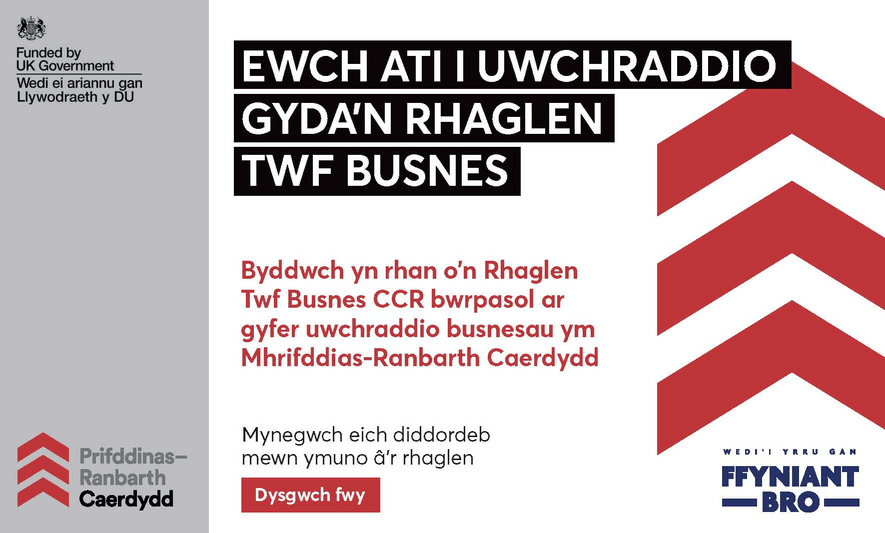The response to the coronavirus pandemic is causing a massive economic shock, the effects of which will certainly last for months, if not years. It is also causing people to rethink all sorts of ideas they have about the way the free economy works, and the shape of global, national and local economies in the years to come.
In the Cardiff Capital Region (CCR), work is underway to ensure that the plans and strategies the City Deal had put in place before the pandemic enable it to play a full role in helping the region tackle the economic impact of the lockdown, and emerge in the aftermath, more resilient and capable of delivering a positive and enduring legacy.
A three phase approach to Interventions is being considered:
In the first phase, the emphasis is on helping businesses get the most from the array of support programmes that have been put in place by the UK and Welsh governments by providing accurate and up to date information. In addition, the CCR will gather evidence about the impact of the pandemic on different sectors, which will help it to develop more bespoke support, and reduce the risk of social harm from the sharp downturn.
Finally, the CCR will look again at its planned programmes and investments in areas such as housing, graduate skills and transport, to see whether they need updating in the light of what has happened during the pandemic. There may be opportunities for more differentiated approaches, for example, to assess the balance of infrastructure needed in the future – across roads and digital – as well as rebalancing travel in the region away from the current ratios of 80:10:10 for private car use, public transport and active travel.
The second phase will see the CCR helping businesses as we gradually emerge from economic hibernation. More digital and virtual forms of business support will be required to encourage entrepreneurs set up new businesses, which tend to be responsible for most new job creation. New funds will be set up to help mitigate the effects of the lockdown on businesses. These could include: an SME Co-investment Fund, designed to support businesses in priority sectors during scale-up; Investment Readiness support to help businesses access finance by raising the quality of their proposals; and a Strategic Premises Fund intended to increase the number, mix and diversity of businesses who can operate differently and locate outside the region’s main cities.
Another proposal is for a Rebuilding Local Economies Challenge Programme, aimed at building new thinking, ways of working, and products to deliver new momentum to the regional foundational economy as it recovers from the lockdown.
The development of CCR’s medtech cluster could be accelerated, through the CCR’s Investment Framework, building on the manufacturing businesses that have diversified during the pandemic and playing to strengths in rapid sanitisation, 3D printing of medical devices, data mapping, alternative materials for face shields, and in new diagnostics and devices. There is real potential for this to support higher level policy goals such as localising critical supply chains.
Finally in this phase, the CCR will respond quickly to businesses in key sectors that have fallen between the cracks in the UK and Welsh Government’s support schemes, to help stabilise them through new products and support where there is a demonstrable need, such as convertible equity, guarantees and provision of security and collateral backing.
For the third phase, CCR has reiterated its commitment to promoting the growth of key sectors which it had already identified as the ones that would play a critical role in the region’s future economic success; in particular data and digital, creative, infrastructure, compound semiconductors, cyber, medtech, and fintech. In addition, there will be a focus on renewing the foundational economy, helping the food, farming, retail, and tourism sectors adapt and thrive in the face of disruptive forces of AI and machine learning.
Finally, the CCR will aim to improve the productivity of medium-sized firms, of which there are around 1,300 across the region employing between 50 and 249 people each. Capital Region firms in this category are underperforming compared to their counterparts in the rest of the UK, and the CCR would aim to end that underperformance by sharing best practice, providing networking opportunities and giving access to a high level executive education programme.
Taken together, all the proposals in this three-step plan amount to a very substantial intervention by CCR to help businesses and the regional economy bounce back from the shock of the coronavirus lockdown. While the CCR cannot change the wider national and global economic context, nor shape by itself, so-called Covid futurology, it intends to continue to make sense of the cross-currents, understand the drivers that might shape what comes next and do whatever it can to help make regional businesses and communities fit to face an uncertain future.










